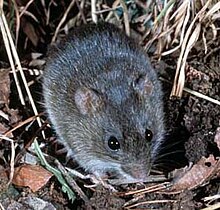Oryzomys peninsulae (Oryzomys peninsulae)
| Oryzomys peninsulae | ||||||
|---|---|---|---|---|---|---|
![Череп[1]](http://upload.wikimedia.org/wikipedia/commons/thumb/4/4c/Oryzomys_peninsulae_skull_dorsal.png/227px-Oryzomys_peninsulae_skull_dorsal.png) Череп[1] | ||||||
| Научная классификация | ||||||
|
Домен: Царство: Подцарство: Без ранга: Без ранга: Тип: Подтип: Инфратип: Надкласс: Клада: Клада: Класс: Подкласс: Клада: Инфракласс: Магнотряд: Надотряд: Грандотряд: Отряд: Подотряд: Инфраотряд: Надсемейство: Семейство: Подсемейство: Триба: Род: Вид: Oryzomys peninsulae |
||||||
| Международное научное название | ||||||
| Oryzomys peninsulae Thomas, 1897 | ||||||
| ||||||
Oryzomys peninsulae (лат.) — вид грызунов из западной Мексики. Ареал ограничен южным мысом Калифорнийского полуострова. Принадлежит к роду Oryzomys семейства хомяковых. Известны только 12 особей найденных в 1900. Последующее разрушение среды обитания близ рек могло привести к его вымиранию.

Для своего рода вид имел средние размеры. Первоначально был описан как отдельный вид, но позднее приписан к другим более распространённым видам. В 2009 был вновь выделен в отдельный вид. Он отличается по окраске меха — передняя часть серо-коричневая, задняя — красновато-коричневая, и по некоторым размерам черепа: большому neurocranium (часть черепа, непосредственно защищающая мозг), крепким скуловым дугам и длинному incisive foramina (отверстию в нёбе между резцами и молярами).
Впервые вид был обнаружен в 1896. В 1897 Олдфилд Томас описал его как полноправного члена рода Oryzomys. До 1971 вид считался отдельным видом, связанным с O. couesi и O. palustris, пока Филипп Гершковиц не объединил его и другие периферийные популяции в один подвид расширенного вида O. palustris. Реймонд Халл во втором издании (1981) Mammals of North America согласился с этим решением, утверждая, что O. peninsulae меньше отличается от популяции материковых Oryzomys (в настоящее время относится к O. couesi mexicanus), в то время как представители, включённые им в вид O. palustris в большей степени отличаются друг от друга.
Примечания
[править | править код]- ↑ Goldman, 1918, plate I
Литература
[править | править код]- Alvarez-Castañeda, S.T. 1994. Current status of the rice rat, Oryzomys couesi peninsularis (subscription required). The Southwestern Naturalist 39(2):99-100.
- Benson, D.E. and Gehlbach, F.R. 1979. Ecological and taxonomic notes on the rice rat (Oryzomys couesi) in Texas (subscription required). Journal of Mammalogy 60(1):225-228.
- Carleton, M.D. and Arroyo-Cabrales, J. 2009. Review of the Oryzomys couesi complex (Rodentia: Cricetidae: Sigmodontinae) in Western Mexico. Bulletin of the American Museum of Natural History 331:94-127.
- Goldman, E.A. 1918. The rice rats of North America. North American Fauna 43:1-100.
- Hall, E.R. 1981. Mammals of North America. Volume II. Caldwell, New Jersey: The Blackburn Press, pp. 601—1181, 1-90 (index). ISBN 1-930665-31-8
- International Commission on Zoological Nomenclature. 1999. International Code of Zoological Nomenclature. 4th ed. London: The International Trust for Zoological Nomenclature. ISBN 0-85301-006-4
- Merriam, C.H. 1901. Synopsis of the rice rats (genus Oryzomys) of the United States and Mexico. Proceedings of the Washington Academy of Sciences 3:273-295.
- Musser, G.G. and Carleton, M.D. 2005. Superfamily Muroidea. Pp. 894—1531 in Wilson, D.E. and Reeder, D.M. (eds.). Mammal Species of the World: A Taxonomic and Geographic Reference. 3rd ed. Baltimore: The Johns Hopkins University Press, 2 vols., 2142 pp. ISBN 978-0-8018-8221-0
- Schmidt, C.A. and Engstrom, M.D. 1994. Genic variation and systematics of rice rats (Oryzomys palustris species group) in southern Texas and northeastern Tamaulipas, Mexico (subscription required). Journal of Mammalogy 75(4):914-928.
- Thomas, O. 1897. Descriptions of new rats and rodents from America. Annals and Magazine of Natural History (6)20:544-553.
- Weksler, M. 2006. Phylogenetic relationships of oryzomyine rodents (Muroidea: Sigmodontinae): separate and combined analyses of morphological and molecular data. Bulletin of the American Museum of Natural History 296:1-149.
- Weksler, M., Percequillo, A.R. and Voss, R.S. 2006. Ten new genera of oryzomyine rodents (Cricetidae: Sigmodontinae). American Museum Novitates 3537:1-29.